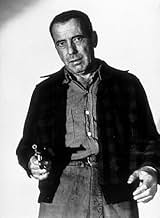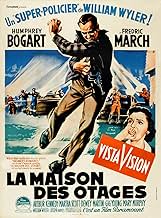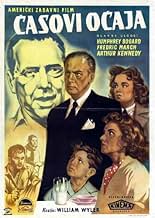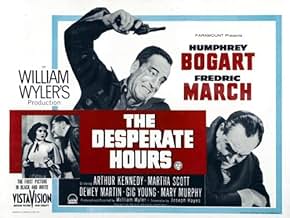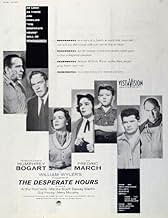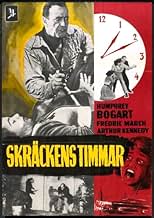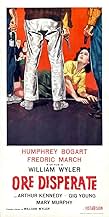CALIFICACIÓN DE IMDb
7.4/10
11 k
TU CALIFICACIÓN
Tres convictos a la fuga se adentran en una casa en la que aterrorizan a sus habitantes.Tres convictos a la fuga se adentran en una casa en la que aterrorizan a sus habitantes.Tres convictos a la fuga se adentran en una casa en la que aterrorizan a sus habitantes.
- Dirección
- Guionistas
- Elenco
- Premios
- 2 premios ganados y 1 nominación en total
Walter Baldwin
- George Patterson
- (sin créditos)
John Benson
- Bellboy
- (sin créditos)
Paul E. Burns
- Chef at Al's Dining Room
- (sin créditos)
Edmund Cobb
- Mr. Walling
- (sin créditos)
Opiniones destacadas
These are the times when danger looks us in the face, when terror, torment, tyranny lends an embrace, as all we cherish and endear, goes toe to toe with every fear, and the world that was secure, falls out of place. When every movement of the clock is an attack, facades of life engraved with fractures, widened cracks - tremors, trembles, quaking dread, in not too long, you might be dead, as the desperation reaches, a climax.
It's of its time but it does still stand up to be counted all these years later, with superb performances throughout, especially HB, who as an actor matured with magnificence in the latter years of his movie making career.
It's of its time but it does still stand up to be counted all these years later, with superb performances throughout, especially HB, who as an actor matured with magnificence in the latter years of his movie making career.
Bogie had done films like this one before: The Petrified Forest (1936), High Sierra (1941), Key Largo (1948) and We're No Angels (1955) all with Bogie as a gangster or victim of a gangster, in a desperate setting (although the last one is a comedic spoof). Desperate Hours, however, is different this time out, Bogie (as Glen Griffin) has a whole suburban family as hostage as he tries to complete his run for freedom from the law. Is this the first such home invasion type movie? Perhaps Suddenly (1954)?
The story is simply superb. Every good narrative succeeds because of certain literary aspects: a believable story line, down-to-earth dialog that supports it, a good measure of irony at appropriate turning points, just the right amount of coincidence that can intrude on anybody's daily experience, a dogged police officer who just won't give up in the search for what he believes, and a family an ordinary family that finds within itself the courage, imagination, and strength to persevere in the face of the real threat of death.
I saw this film long ago when just a lad, so I didn't recall much of the story at all. But, being a Bogie fan, I looked forward to seeing it again when I got a hold of a DVD recently. I don't recall what movies were in the running for the Oscars that year, but I think this should have been a contender (apparently, it wasn't).
The cast was well chosen. Bogie, of course, was "made" for this part, having done so many like it in the past and that's not a side-swipe at typecasting; Robert Middleton almost steals the movie with his portrayal of the psychopathic Kobish -- a chilling portrayal; Dewey Martin as Bogie's brother, Hal, provides a sense of decency that the other two lack, the only jarring note for me: why should he? He's on the run, and drops all pretense of humanity when he decides to cut and run by himself. And, we know what happens to anybody who cuts and runs, right? Frederic March as Dan Hilliard ably shows what can happen to your principles and behavior when lives are at stake: most of life's niceties go out the window as he tries to save his family. Understandable, given the desperate situation. Martha Scott as his wife and Mary Murphy as his daughter (Cindy) are suitably frightened most of the time, but they also summon the courage to oppose the bad guys when possible. The guy who isn't used so much is Arthur Kennedy as deputy sheriff Bard, but his role is pivotal in bringing the story to a satisfactory ending. Pity, because Kennedy was as fine an actor as Bogie or March. Gig Young, as Cindy's suitor, rounds out the main cast he playing the puzzled hopeful who just won't go away when Cindy pleads with him to "stay away". It's just as well that he didn't...
The setting in small town America is just right, the picture perfect home of the Hilliards standing for the American dream that is about to threatened and even destroyed. Which gives rise to one of the best lines in cinema history, spoken by March near the end: "Get out get out of my house!" he nearly screams at Bogie, thus cementing forever in film the idea of a man's home as his castle. Bogie visibly wilts before the stern and righteous wrath of March but not only because of that does Bogie give it all up. You'll have to see the film to understand why.
Most of the action is within the confines of the Hilliard house (having been a stage play first, that makes sense) and the cinematography takes full advantage of all those nooks and crannies to enthrall the viewer and keep the suspense running. I liked particularly the reasonably long take of the camera behind the bad guys while they watch the old trash collector do his work and who seems to miss the presence of their stolen car in the garage. It's a priceless piece of work as the escapees faces keep looking at each other and then at the old man and the viewer stays on edge, all the time, wondering: will he react?
The final showdown is simply a tour de force. It's fast and furious, ranging all through the ground floor, up the stairs and into the bedrooms, and then back again, as the protagonists fight it out for supremacy; I was reminded of Dustin Hoffman's running fight with the bad guys in Straw Dogs (1971). In the hands of an inept director, it would have been farcical but Wyler turns on the suspense and the irony as March overcomes his adversary Bogie in one of the coolest ways imaginable. No, I won't tell you, because that would spoil it for you.
As the credits rolled by at the end, my immediate thought was that this type of story is so believable, it could happen to me, or you...
The story is simply superb. Every good narrative succeeds because of certain literary aspects: a believable story line, down-to-earth dialog that supports it, a good measure of irony at appropriate turning points, just the right amount of coincidence that can intrude on anybody's daily experience, a dogged police officer who just won't give up in the search for what he believes, and a family an ordinary family that finds within itself the courage, imagination, and strength to persevere in the face of the real threat of death.
I saw this film long ago when just a lad, so I didn't recall much of the story at all. But, being a Bogie fan, I looked forward to seeing it again when I got a hold of a DVD recently. I don't recall what movies were in the running for the Oscars that year, but I think this should have been a contender (apparently, it wasn't).
The cast was well chosen. Bogie, of course, was "made" for this part, having done so many like it in the past and that's not a side-swipe at typecasting; Robert Middleton almost steals the movie with his portrayal of the psychopathic Kobish -- a chilling portrayal; Dewey Martin as Bogie's brother, Hal, provides a sense of decency that the other two lack, the only jarring note for me: why should he? He's on the run, and drops all pretense of humanity when he decides to cut and run by himself. And, we know what happens to anybody who cuts and runs, right? Frederic March as Dan Hilliard ably shows what can happen to your principles and behavior when lives are at stake: most of life's niceties go out the window as he tries to save his family. Understandable, given the desperate situation. Martha Scott as his wife and Mary Murphy as his daughter (Cindy) are suitably frightened most of the time, but they also summon the courage to oppose the bad guys when possible. The guy who isn't used so much is Arthur Kennedy as deputy sheriff Bard, but his role is pivotal in bringing the story to a satisfactory ending. Pity, because Kennedy was as fine an actor as Bogie or March. Gig Young, as Cindy's suitor, rounds out the main cast he playing the puzzled hopeful who just won't go away when Cindy pleads with him to "stay away". It's just as well that he didn't...
The setting in small town America is just right, the picture perfect home of the Hilliards standing for the American dream that is about to threatened and even destroyed. Which gives rise to one of the best lines in cinema history, spoken by March near the end: "Get out get out of my house!" he nearly screams at Bogie, thus cementing forever in film the idea of a man's home as his castle. Bogie visibly wilts before the stern and righteous wrath of March but not only because of that does Bogie give it all up. You'll have to see the film to understand why.
Most of the action is within the confines of the Hilliard house (having been a stage play first, that makes sense) and the cinematography takes full advantage of all those nooks and crannies to enthrall the viewer and keep the suspense running. I liked particularly the reasonably long take of the camera behind the bad guys while they watch the old trash collector do his work and who seems to miss the presence of their stolen car in the garage. It's a priceless piece of work as the escapees faces keep looking at each other and then at the old man and the viewer stays on edge, all the time, wondering: will he react?
The final showdown is simply a tour de force. It's fast and furious, ranging all through the ground floor, up the stairs and into the bedrooms, and then back again, as the protagonists fight it out for supremacy; I was reminded of Dustin Hoffman's running fight with the bad guys in Straw Dogs (1971). In the hands of an inept director, it would have been farcical but Wyler turns on the suspense and the irony as March overcomes his adversary Bogie in one of the coolest ways imaginable. No, I won't tell you, because that would spoil it for you.
As the credits rolled by at the end, my immediate thought was that this type of story is so believable, it could happen to me, or you...
Few actors can play a gangster like Humphrey Bogart and few actors can play a decent family man like Fredric March. Both combine to give excellent performances in this thriller that explores three desperate men invading an upper middle class home after escaping from prison. William Wyler sees to it that his audience feels confined as most all the scenes are within the home. It builds to a dramatic conclusion that might not be what you expect but non-the-less believable. You feel empathy for Bogarts character and for that of his brother but ,even so, you will be rooting for the family to survive. An excellent cast adds a lot to this film. There are a few overly dramatic moments, however, they are brief.Desperate Hours will entertain you and keep you guessing. Try and see it!
A lot of loopy comments out there about this one. "Predictable" is a very over-used adjective that I've certainly been guilty of myself, but what exactly is supposed to happen in a hostage-taking, domestic thriller like this? Are aliens supposed to land in the Hilliards' back yard and vaporize everyone? Is Bogart's escaped con supposed to dress up in drag at some point and decide he wants to become a chorus girl? Would that satisfy those who find this movie predictable?
"The Desperate Hours" keeps you on the edge of your seat; it more than passes the test as a thriller and it most certainly has not mellowed over time. The script is fine, intelligently examining how the respectably middle class but somewhat complacent father (Frederic March) draws strength and courage from the love of his wife and kids in handling the ordeal. Though each family member is formulating their own strategy for how best to resolve the crisis (their brains are always going "clickity-clickity-click" as Bogart mockingly keeps reminding them) they recognize March as the father and as such the captain of the ship. They look to him for leadership and he responds. It's telling that when the young son disobediently puts his ill-conceived plan into action, it undermines the father's nearly successful tactic. Though he had earlier suspected his dad of being cowardly for not taking a more aggressive stance, from this point on he begins to appreciate all the variables he must take into account and looks up to him once more. The idealized, but by no means wildly unrealistic domestic situation reflects the mood of the time. Why on earth would it possibly reflect cynically 90's attitudes and sensibilities, as some reviewers seem to desire?
There are casting decisions pertaining to age differences which raise an eyebrow, but do not seriously detract from William Wyler's (as masterful and dependable a director as Hollywood has ever cranked out) otherwise polished production. At 42 of course, Gig Young seems a tad old for the family's 19 year old daughter (beautiful Mary Murphy) but he's still youthful enough looking and he puts an interesting spin on what is usually the thankless role of the boyfriend who stumbles into things. One of the beauties of B&W photography is that it can always be used to make actors look as many as 5-15 years younger than they are. This comes into play with Bogart's character as well, as he's asked to be the older brother of 32 year old Dewey Martin, and it's something that I didn't have too hard a time buying. It's difficult to believe this was one of his last films, as he seems quite vigorous and robust in the part.
Tense, exciting, well-acted and directed; this is indisputably far superior to Michael Cimino's bloody and botched 1990 Mickey Rourke "star" vehicle remake.
"The Desperate Hours" keeps you on the edge of your seat; it more than passes the test as a thriller and it most certainly has not mellowed over time. The script is fine, intelligently examining how the respectably middle class but somewhat complacent father (Frederic March) draws strength and courage from the love of his wife and kids in handling the ordeal. Though each family member is formulating their own strategy for how best to resolve the crisis (their brains are always going "clickity-clickity-click" as Bogart mockingly keeps reminding them) they recognize March as the father and as such the captain of the ship. They look to him for leadership and he responds. It's telling that when the young son disobediently puts his ill-conceived plan into action, it undermines the father's nearly successful tactic. Though he had earlier suspected his dad of being cowardly for not taking a more aggressive stance, from this point on he begins to appreciate all the variables he must take into account and looks up to him once more. The idealized, but by no means wildly unrealistic domestic situation reflects the mood of the time. Why on earth would it possibly reflect cynically 90's attitudes and sensibilities, as some reviewers seem to desire?
There are casting decisions pertaining to age differences which raise an eyebrow, but do not seriously detract from William Wyler's (as masterful and dependable a director as Hollywood has ever cranked out) otherwise polished production. At 42 of course, Gig Young seems a tad old for the family's 19 year old daughter (beautiful Mary Murphy) but he's still youthful enough looking and he puts an interesting spin on what is usually the thankless role of the boyfriend who stumbles into things. One of the beauties of B&W photography is that it can always be used to make actors look as many as 5-15 years younger than they are. This comes into play with Bogart's character as well, as he's asked to be the older brother of 32 year old Dewey Martin, and it's something that I didn't have too hard a time buying. It's difficult to believe this was one of his last films, as he seems quite vigorous and robust in the part.
Tense, exciting, well-acted and directed; this is indisputably far superior to Michael Cimino's bloody and botched 1990 Mickey Rourke "star" vehicle remake.
THE DESPERATE HOURS
Aspect ratio: 1.85:1 (VistaVision)
Sound format: Mono
(Black and white)
The patriarch of a middle-class suburban family (Fredric March) is forced to take action when they're held hostage in their own home by three escaped convicts, one of whom (Humphrey Bogart) is an experienced lifer with nothing to lose...
The first and only pairing of superstars Bogart and March is a tightly-wound thriller, written by Joseph Hayes (based on his novel and stageplay, inspired by actual events), and directed by Hollywood veteran William Wyler, distancing himself from the 'women's pictures' he had helped to popularize during the 1940's (THE LITTLE FOXES, MRS. MINIVER, THE HEIRESS etc.). Photographed in gleaming deep-focus VistaVision by Lee Garmes (SCARFACE, THE PARADINE CASE), the movie wrings incredible tension from the claustrophobic settings and frequent stand-offs between staunch family man March and embittered con Bogart. The movie's themes are fairly conservative and the outcome is never really in doubt, but this is a top-drawer thriller from Hollywood's 'golden age'. Also starring Arthur Kennedy, Martha Scott, Dewey Martin and Gig Young in crucial supporting roles. Unmissable.
NB. Though nowhere near as dreadful as most critics would have you believe, Michael Cimino's remake DESPERATE HOURS (1990) isn't a patch on the original.
Aspect ratio: 1.85:1 (VistaVision)
Sound format: Mono
(Black and white)
The patriarch of a middle-class suburban family (Fredric March) is forced to take action when they're held hostage in their own home by three escaped convicts, one of whom (Humphrey Bogart) is an experienced lifer with nothing to lose...
The first and only pairing of superstars Bogart and March is a tightly-wound thriller, written by Joseph Hayes (based on his novel and stageplay, inspired by actual events), and directed by Hollywood veteran William Wyler, distancing himself from the 'women's pictures' he had helped to popularize during the 1940's (THE LITTLE FOXES, MRS. MINIVER, THE HEIRESS etc.). Photographed in gleaming deep-focus VistaVision by Lee Garmes (SCARFACE, THE PARADINE CASE), the movie wrings incredible tension from the claustrophobic settings and frequent stand-offs between staunch family man March and embittered con Bogart. The movie's themes are fairly conservative and the outcome is never really in doubt, but this is a top-drawer thriller from Hollywood's 'golden age'. Also starring Arthur Kennedy, Martha Scott, Dewey Martin and Gig Young in crucial supporting roles. Unmissable.
NB. Though nowhere near as dreadful as most critics would have you believe, Michael Cimino's remake DESPERATE HOURS (1990) isn't a patch on the original.
¿Sabías que…?
- TriviaThe character of Glenn Griffin was made older so Humphrey Bogart could play the role. The stage version starred Karl Malden and a young Paul Newman in the Bogart role.
- ErroresBefore Glenn asks Eleanor if she could make a phone call without crying, he puts his left hand in his pocket. When she stands up and walks to the phone, he puts the same hand in the pocket again.
- Citas
[first lines]
[the morning newspaper hits the front door]
Ellie Hilliard: I'll get it, darling.
Daniel Hilliard: [about the newspaper boy's routine of always hitting the front door with the newspaper] Some morning I'm gonna catch up with that kid.
Selecciones populares
Inicia sesión para calificar y agrega a la lista de videos para obtener recomendaciones personalizadas
- How long is The Desperate Hours?Con tecnología de Alexa
Detalles
- Fecha de lanzamiento
- País de origen
- Idioma
- También se conoce como
- Casovi ocaja
- Locaciones de filmación
- Productora
- Ver más créditos de la compañía en IMDbPro
Taquilla
- Presupuesto
- USD 2,388,000 (estimado)
- Tiempo de ejecución1 hora 52 minutos
- Color
- Relación de aspecto
- 1.37 : 1(original ratio)
Contribuir a esta página
Sugiere una edición o agrega el contenido que falta

Principales brechas de datos
By what name was The Desperate Hours (1955) officially released in India in English?
Responda

